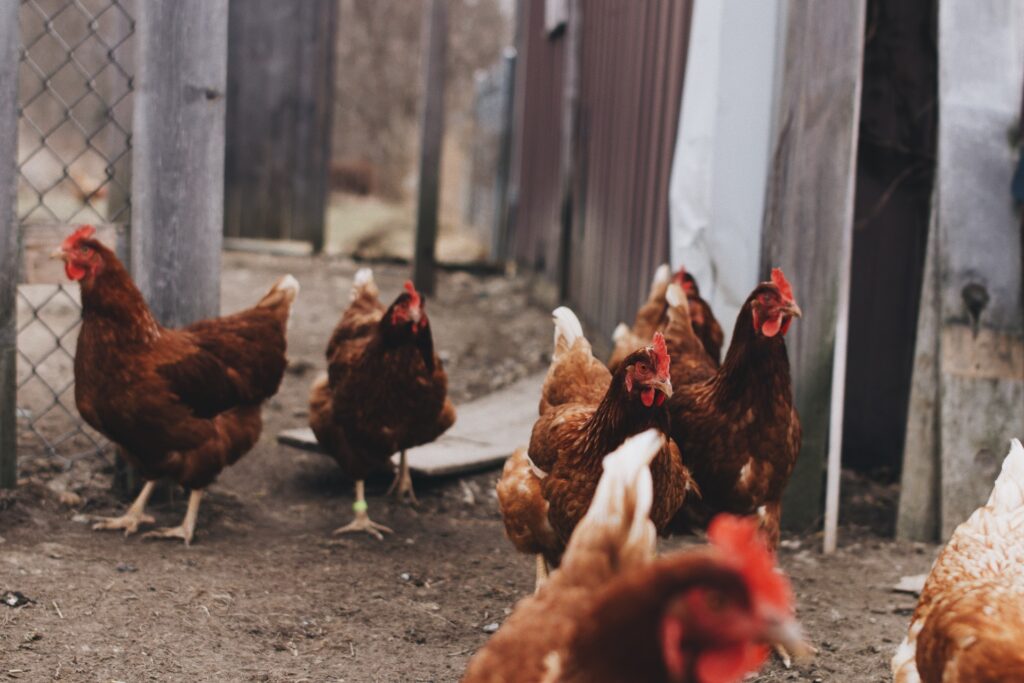FILE PHOTO: flock of chickens. Photo by Brianna Tucker on Unsplash
LOGAN – Avian influenza has found its way to two flocks in Idaho and one in Utah over the weekend. Utah County had one backyard flock infected with the highly pathogenic sickness. In Idaho, Caribou and Gooding counties reported on April 15 having two cases of the flu.

One back yard chicken flock of seven have all died in the Caribou County outbreak and in Gooding birds will be depopulated today, said Dr. Christie Hammons, the deputy administrator of the Idaho Department of Agriculture.
“It happens fast,” Hammons said. “There are biosecurity measures people can take to lessen the risk.”
She said they knew it was coming to the West.
“It started in the eastern part of the country and slowly made it to us,” she said. “There have been cases in Wyoming, Montana and Utah.”
Avian influenza is an infection caused by the most common influenza virus. It is transmitted by wild waterfowl and can infect poultry.
“No state will be untouched,” Hammons said. “There are some bio security measures people can take to help prevent it. They are listed on our website at agri.idaho.gov.”
There is no mandatory testing in the U.S. Human infection can be passed form bird to bird but it is uncommon for it to be passed to humans.
Baillee Woolstenhulme, the public information officer for the Utah Department of Agriculture and Food, confirmed the case of avian flu in Utah County and said it was a backyard flock.
“Our state veterinarian’s office was notified of symptomatic birds in Utah County and our team was immediately dispatched to assess the situation,” said Utah State Veterinarian Dr. Dean Taylor. “Proper steps have been taken to prevent further spread of the disease.”
Cache Valley is home to several large flocks of chickens with commercial egg farms in both Cache and Franklin counties.
UDAF officials are working closely with the United States Department of Agriculture’s (USDA) Animal and Plant Inspection Service (APHIS) on their incident response.
As part of existing avian influenza response plans, UDAF and its federal partners are working jointly on additional surveillance and testing in areas around the affected flock.
Anyone with birds located in Utah are asked to vigilantly watch flock for symptoms of HPAI, which include high death loss among flocks, nasal discharge, decreased appetite or water consumption, and lack of coordination in birds. If birds are experiencing any of these symptoms, contact the state veterinarian’s office immediately at statevet@utah.gov.
“All of the commercial bird facilities in the state are pretty well locked down,” she said. “The biggest threats are where wild birds integrated with domestic poultry.”
Samples from the flocks were tested at the Utah Veterinary Diagnostic Laboratory, part of the National Animal Health Laboratory Network, and confirmed at the APHIS National Veterinary Services Laboratories in Ames, Iowa.

Utah and Idaho animal health officials are working with APHIS on a joint incident response. Officials from both states have quarantined the affected premises, and birds will be depopulated to prevent the spread of the disease. Birds from the flocks will not enter the food system.
Small backyard to commercial producers should review their biosecurity measures to assure the health of their birds. APHIS has materials about biosecurity, including videos, checklists, and a toolkit available at: https://www.aphis.usda.gov/aphis/ourfocus/animalhealth/animal-disease-information/avian/defend-the-flock-program/dtf-resources/dtf-resources.
The U.S. Centers for Disease Control and Prevention said the recent HPAI detections do not present an immediate public health concern. No human cases of these avian influenza viruses have been detected in the United States. As a reminder, the proper handling and cooking of all poultry and eggs to an internal temperature of 165˚F is recommended as a general food safety precaution.

